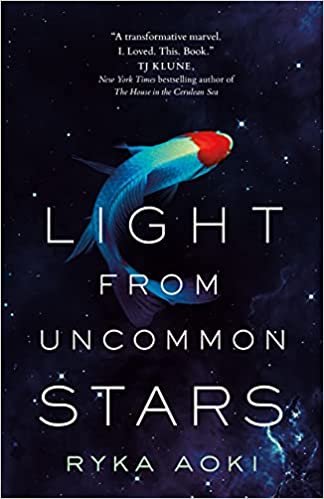This book, friends. THIS BOOK. Do you want to read something you will then have to close and hug to your chest partway through? Do you want to read a book that never flinches from the truth but never gives up on beauty? Do you want a queer loves story, a celebration of so many kinds of love and joy? Then Ryka Aoki’s Light from Uncommon Stars is for you. It’s for everyone, but it’s especially for you. Yes, you.
I’ve started with the emotional impact of this book because the narrative premises are both simple and convoluted. Whichever way you start explaining the premise of this book, by the end of it you’ll be getting a funny look. “Sci-fi…with a demon? Classical music…and donuts?” That’s right. It’s both sci-fi and fantasy; it’s the soul at the extremes of tormented expression and in the comforting confines of pleasure; it’s the triumphs of the self and the triumphs of a community. And you know what that makes it? Art. This book is art. It’s about art, too, both “high” and “low” art, which Aoki knows are bullshit categories and deconstructs quite thoroughly.

Let’s start there: the “high” art of classical music, which has become inaccessible to many through a combination of unavailability and gatekeeping, but is at its core still about expression and connection that all good music taps into. And then the art that is less celebrated, the delights of a perfect snack or meal, or the orchestration of video games. But joy, says Aoki, is joy, and connection is connection. It’s that feeling that matters, pulsing between individuals to form a bond more than the sum of its parts. It doesn’t matter who those individuals are. They don’t even have to be human.
Lan and her family aren’t human. They’ve come from a distant, star-spanning empire as refugees from a vast war. All they want is to blend in and make donuts. They only look human—as does Shizuka Satomi, a renowned violinist who was definitely born human but may have become something more (or less) thanks to a deal with Hell. But what is humanity, anyway? We talk about it like it’s a positive, but humans are so endlessly cruel. Certainly Katrina hasn’t experienced much of this so-called humanity, and finds more solace in playing her violin and staying safely behind a screen than she does with her family or her so-called friends.
Katrina begins the book by escaping her abusive father who doesn’t accept her gender identity, only to fall in briefly with a group of shitty queers, which is an important counterpoint in the rhapsodies of found family. Just because people are like you in some key aspect doesn’t mean they’re your family. They actually have to take care of you, protect you, support you. Utopias—queer or not specifically queer—don’t just happen. Found family is about actively looking and trying to create bonds, while also celebrating the happy accidents of fortune. And everyone involved has to be trying.
Trying, even if they’re not always successful. All of the characters make mistakes and incorrect assumptions. They all come from places of trauma. There’s some heavy stuff in Light from Uncommon Stars, but not gratuitous and not—this is less of a spoiler and more of a green flag—a kill-your-queers situation. For example, there is survival sex work; Katrina and Shizuka’s discussion about that work gives rather than takes dignity from it. Aoki acknowledges the soul- and body-hurting aspects that are all too often part of it. But Light from Uncommon Stars left room for understanding that sex work provides for the worker—provides money, yes, but also sometimes other kinds of value in the form of validation or pleasure. I appreciated the nuance there, and also the frankness of the discussion.
Some of this book reads like all the things you wanted someone to say to you when you were alone and needed advice or protection. Could some of this—the wealthy benefactress, the magical advantages, the technological protections—be considered wish-fulfillment? You’re damn right it could, and that’s a good thing. Plenty of people in SFF are handed swords and starships and big shiny destinies. Why not Katrina? Why not Shizuka, Lan, and everyone else? And why can’t those destinies be self-directed, like making donuts and playing music, as well as taking on the Big Bad? A demon isn’t even the biggest bad—Aoki really pulls out all the stops by refusing to personify evil, and make the evils plain: entropy, cruelty, and apathy are what all her characters are fighting. And the goal is not to defeat them—that would result mostly in despair—but to resist.
This is a book of spectacular resistance. It is about the various modes of resistance—of art, of safety, of rest and affirmation—and how acts both small and huge all add up. It is a defiant, gorgeous spectacle of queer fury and queer joy, a demand that wholeness be the minimum standard. It’s also a tender, sympathetic guide and a promise for anyone whose wholeness is denied—their gender, their sexuality, their personhood, their passion, their skill, or anything else. The universe—physical and metaphysical—is big enough to contain you, and contains people who will love you. Yes, you.
Light from Uncommon Stars will be released September 28th.
